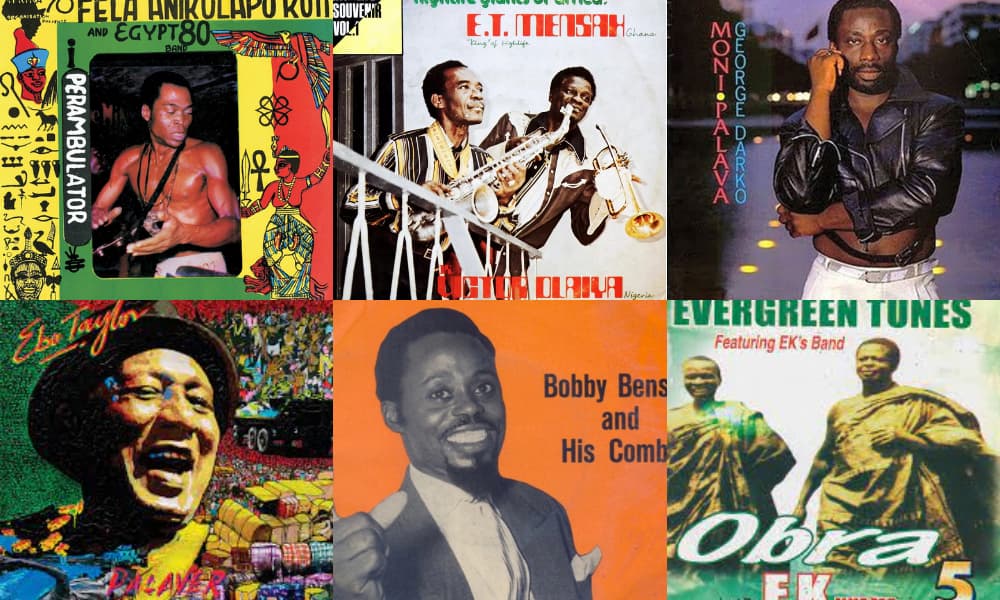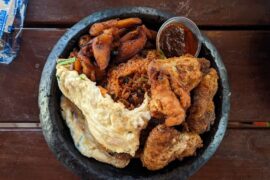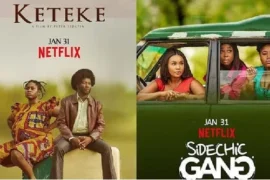The Rise of Highlife in the ’80s
As the 1980s unfolded, Ghana witnessed a vibrant resurgence of Highlife music, which not only reflected the country’s cultural identity but also resonated deeply with the aspirations of its people. This era marked a significant highlife evolution, driven by innovative rhythms and lyrical themes that mirrored social changes. You’d find artists collaborating across genres, blending traditional Highlife with elements of jazz, funk, and reggae, creating a rich tapestry of sound that captivated audiences. These musical collaborations not only showcased individual talents but also fostered a sense of unity among musicians. As you explore this rich period, you can appreciate how Highlife became a powerful medium for expression, reflecting the hopes and challenges of Ghanaians during a transformative decade.E.T. Mensah: The King of Highlife
E.T. Mensah, often hailed as the King of Highlife, markedly shaped the genre’s evolution in Ghana and beyond. His infectious rhythms and melodies crafted a distinctive sound that captivated audiences, influencing generations of musicians. You can trace Highlife’s roots back to his innovative fusion of traditional African music with jazz and swing, creating a vibrant cultural expression. E.T. Mensah’s influence extends beyond his iconic hits; he set the stage for future artists, embedding Highlife into the national identity. His performances, brimming with energy, drew people together, fostering a sense of community. As you explore the landscape of Ghanaian music, remember that E.T. Mensah’s legacy continues to resonate, reminding you of the power music has to transform and unite.Amakye Dede: The Voice of a Generation
While many artists have made significant contributions to Ghanaian music, Amakye Dede stands out as a defining voice of his generation. His musical journey reflects a deep connection to cultural heritage, blending traditional highlife with contemporary sounds. You can’t help but feel the impact of his soulful performances, which resonate with fans across generations. Amakye’s influential lyrics tackle love, struggle, and joy, forging lasting connections with listeners. His legendary collaborations have enriched the industry, creating timeless melodies that remain popular today. Despite facing industry challenges, his unwavering spirit shines through every concert experience, where he captivates audiences with his magnetic presence. Amakye Dede truly embodies the essence of Ghanaian music, leaving an indelible mark on its landscape.Top 6 hardest-hitting beef songs in the history of Ghanaian music
Beef? In the world of music, it can best be described as a lyrical joust — artistes trading sharp jabs over blazing beats. For fans, it’s an exhilarating spectacle, keeping them glued as musicians dig deep for punchlines aimed at knocking out their rivals. These clashes often go beyond diss tracks, spilling into
Nana Ampadu: Storyteller and Innovator
Amakye Dede’s profound impact on Ghanaian music paves the way for another iconic figure: Nana Ampadu. As a storyteller and innovator, Nana Ampadu masterfully blends traditional storytelling with contemporary themes, creating songs that resonate deeply with listeners. His influences range from folk narratives to social issues, reflecting the rich tapestry of Ghanaian life. You’ll find that his music often serves as a vessel for cultural heritage, preserving stories that could easily fade away. Ampadu’s unique ability to weave intricate tales into melodies not only entertains but also educates.The Influence of Reggae and Dancehall
As reggae and dancehall rhythms began to seep into the fabric of Ghanaian music in the 1980s, they brought with them a fresh wave of energy and cultural exchange that transformed the musical landscape. You can see how the reggae evolution influenced local artists, who started blending traditional sounds with these vibrant rhythms. This dancehall fusion created a unique soundscape that resonated deeply with the youth, reflecting their aspirations and struggles. The incorporation of Jamaican beats and lyrical styles sparked a creative renaissance, leading to new genres and innovative performances. Artists like Reggie Rockstone emerged, showcasing how these influences could be adapted to Ghanaian culture, ultimately shaping a generation’s identity and musical expression.Women in Ghanaian Music: Pioneers of the ’80s
The vibrant fusion of reggae and dancehall in the 1980s not only redefined Ghana’s musical landscape but also paved the way for women artists to carve out their own spaces in a male-dominated industry. This era marked a significant shift towards female empowerment, as artists like Amakye Dede and others began to challenge societal norms through their music. These pioneers embraced musical innovation, blending traditional sounds with contemporary genres, asserting their identities, and reshaping narratives around women in music. By using their platforms to address social issues, they inspired a generation, proving that women could be powerful voices in Ghana’s cultural tapestry. Their contributions laid the groundwork for future female artists, fostering a legacy that continues to influence the music scene today.Iconic Songs That Defined the Decade
When you think about the 80s in Ghana, you can’t ignore the groundbreaking artists who shaped the music scene with their iconic songs. These tracks didn’t just entertain; they resonated deeply with the youth, influencing cultural trends and dance movements. As you explore the decade’s hits, you’ll see how their infectious rhythms created a soundtrack that defined a generation.Groundbreaking Artists of 80s
Ghana’s music scene in the 80s was a vibrant tapestry woven from the innovative sounds of groundbreaking artists who pushed boundaries and redefined genres. You’d find musicians like E.T. Mensah and Amakye Dede experimenting with highlife, blending traditional rhythms with funk and jazz influences. Their groundbreaking collaborations with international artists not only expanded their reach but also brought fresh perspectives to the local sound. You’d hear the pulsating beats and catchy melodies that defined the decade, reflecting a society in flux. These artists weren’t afraid to take risks, using musical experimentation to capture the essence of Ghanaian culture while appealing to a broader audience. Their influence paved the way for future generations, solidifying their legacy in the annals of music history.Cultural Impact on Youth
Though many factors shaped youth culture in the 80s, iconic songs from Ghana’s music legends played a pivotal role in defining the decade. These tracks became the soundtrack of your life, fostering youth identity and cultural expression. With powerful lyrics, they often resonated with social movements, encouraging you to engage in discussions about change and freedom. Through musical education, you learned about your heritage, while community bonding flourished at gatherings centered around these anthems. The generational influence of these songs created a lasting legacy, allowing for artistic freedom and creativity. As you danced to their rhythms, you formed emotional connections that shaped your identity formation, showcasing how music can unite and inspire the youth towards a brighter future.Aboakyer Festival History Significance and How It’S Celebrated
Marking centuries of tradition, the Aboakyer Festival celebrates the Effutu people’s heritage through vibrant rituals—discover its profound significance and unique customs.
Iconic Danceable Hits
The vibrant sounds of the 80s in Ghana brought forth a wave of iconic danceable hits that not only captured the spirit of the era but also reflected the social and political landscape. These dancefloor anthems, like those from Osibisa and E.T. Mensah, became the soundtrack for youth gatherings, celebrations, and protests alike. You’d find yourself swept away by rhythmic innovations that transformed traditional sounds into something fresh and exhilarating. Songs combined highlife, funk, and reggae elements, creating infectious grooves that guaranteed everyone hit the dancefloor. The pulsating beats and catchy melodies weren’t just entertainment; they united communities and expressed the aspirations of a generation. This musical legacy continues to inspire artists, keeping the rhythm of the 80s alive today.The Cultural Impact of ’80s Ghana Music
While many may associate the vibrant sounds of the ’80s with global pop icons, Ghana’s music scene during this decade forged a unique cultural identity that resonated deeply with its people. This era marked a significant cultural evolution, where various genres like highlife and hiplife blended, showcasing the country’s rich musical diversity. You could feel the rhythm of social change in the lyrics, as artists addressed pressing issues like political unrest and identity struggles. These songs weren’t just entertainment; they became anthems of hope and resilience, uniting communities. The music sparked conversations, celebrated Ghanaian heritage, and inspired a wave of creativity. Ultimately, the ’80s music scene shaped not just the sound of a generation but its very cultural fabric.Legacy of the ’80s: Continuing the Rhythms
The legacy of ’80s Ghana music isn’t just confined to the past; it continues to shape the present. You can see how influential artists from that era have left an indelible mark on contemporary sounds and cultural expressions. Their rhythms resonate today, reminding us of the rich heritage that still inspires new generations of musicians.Influential Artists’ Impact
Although many might view the ’80s as a nostalgic era, the influence of Ghanaian music legends from that decade resonates powerfully in today’s soundscape. You’re likely to hear echoes of their innovative rhythms and melodies in contemporary tracks, showcasing a remarkable musical evolution. These artists not only defined a generation but also paved the way for future musicians through dynamic artistic collaborations. When you listen to modern Ghanaian music, you can trace its roots back to the bold experimentation and cultural fusion initiated in the ’80s. Their ability to blend traditional sounds with global influences continues to inspire today’s artists. This legacy is a reflection of how the foundational work of these legends still shapes the musical landscape you enjoy today.Cultural Resonance Today
Ghanaian music from the ’80s continues to pulse through today’s cultural landscape, creating a vibrant connection between past and present. You can feel this legacy in contemporary genres, where artists draw on the rich rhythms and melodies that defined a generation. These sounds aren’t just nostalgic; they shape cultural identity, weaving together stories of resilience and celebration. As you listen, you’ll notice how musical evolution incorporates elements from traditional highlife and hiplife, blending them with modern influences. This fusion not only honors the legends of the past but also allows new generations to explore their roots. Ultimately, the ’80s music scene isn’t merely a memory; it lives on, evolving and resonating deeply within Ghana’s cultural narrative today.Conclusion
Reflecting on the vibrant music scene of the ’80s in Ghana, you can appreciate how these legends not only shaped a generation but also laid the groundwork for future artists. The fusion of Highlife, reggae, and innovative storytelling created a rich tapestry of sound that still resonates today. As you listen to their iconic songs, you’re reminded of the resilience and cultural pride that continue to define Ghana’s musical landscape, ensuring their legacy endures through the rhythms of time.Discover more from Ghana Scoop
Subscribe to get the latest posts sent to your email.




